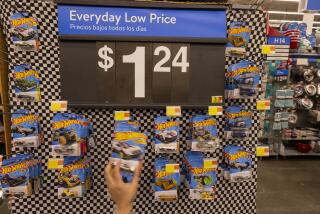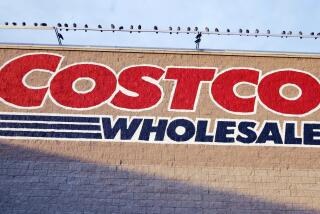Wal-Mart to stock up on cash hubs
Wal-Mart Stores Inc. said Wednesday that it would dramatically expand low-cost financial services such as check cashing and money transfers for its millions of customers who don’t have bank accounts.
The giant retailer, which this year dropped efforts to formally enter banking amid opposition from Congress and regulators, said it would open 1,000 Wal-Mart MoneyCenters by the end of next year, up from about 225 in stores now.
Fair-lending advocates and others questioned Wal-Mart’s intentions, saying the company may be trying to pursue a back door into banking because the front door was blocked.
“Do you really want to concentrate all that economic power if they make that transition into full banking?” asked Stephen Andrews, chief executive of the Bay Area’s Bank of Alameda. “The Senate and the House throughout time has said no.”
Wal-Mart executives, however, said the company would be providing a much-needed service at a significant savings for its customers.
“It is right at the heart of a need of our customers -- we have so many customers who are outside the mainstream banking system,” said Jane Thompson, Wal-Mart’s president of financial services. “We know we can add value to their lives and also save them money.”
In California, check cashing can cost as much as 3% of the amount of a check. That means that a worker whose take-home pay is $25,000 a year could spend $749 annually to cash weekly paychecks -- a service that costs nothing for someone with a free checking account.
At Wal-Mart, which charges 1% for check cashing -- with a maximum fee of $3 a check -- that same worker would pay $249.60 a year.
Money orders typically cost 75 cents to $5 in California, said Alan Fisher, executive director of the California Reinvestment Coalition. At Wal-Mart, a money order costs 46 cents, the company said.
Wal-Mart, which processes more than 2 million financial-service transactions each week, has long sought to expand the business.
Transactions including money transfers, check cashing and bill payment offer a profitable new business for the company that in recent years has suffered from slumping sales and a bruised reputation.
The MoneyCenters are the most profitable part of Wal-Mart’s stores, Thompson said.
Just as importantly, the services give cash-strapped consumers -- a big part of Wal-Mart’s customer base -- new reasons to come to its stores.
The centers are open 7 a.m. to 9 p.m. seven days a week, an important benefit for workers who can’t take care of personal business during banking hours, Wal-Mart said.
“While we believe these initiatives, given their size, will not materially boost earnings in the near-term, we do see them as a positive long-term driver of customer loyalty,” Goldman Sachs analyst Adrianne Shapira wrote Wednesday in a note to clients.
In the face of strong opposition, Wal-Mart this year withdrew its application for what’s known as an industrial loan company, the retailer’s fourth failed bid to open a bank since 1999.
Although the Bentonville, Ark.-based retailer said it would use the bank to save on credit card processing fees and other back-office transactions, critics including banks, farmers and real estate firms contended that the company was looking to put a toe into retail banking.
Wal-Mart’s announcement on Wednesday is a smart sidestep around that issue, said Richard X. Bove, a financial institutions analyst at Punk, Ziegel & Co. in Tampa, Fla.
“Wal-Mart simply made the decision to do the things legally available to it without seeking approval from Congress or any other entity,” Bove said. “I think it’s brilliant. It makes a lot of sense.”
The company also said it would expand a pilot program that offered a Wal-Mart/Visa reloadable debit card, issued by GE Money, to 1,300 stores by the end of June and to all of its more than 3,300 U.S. discount and Supercenter stores by the end of the year.
Wal-Mart’s MoneyCard, which costs $8.94, requires no credit check or bank account and can be used immediately after activation.
The card carries a monthly fee of $4.94, which Wal-Mart waives if customers load at least $1,000 on the card in a month. A reloading fee of $4.64 is waived if customers add funds from a check-cashing transaction at Wal-Mart.
Funds on the card are FDIC-insured and money on lost or stolen cards will be refunded, Wal-Mart said.
Still, some community activists aren’t cheering for Wal-Mart’s financial services programs.
“Wal-Mart will offer cheaper check cashing, but not the full array of services that any neighborhood needs -- mortgages, small-business loans, the kinds of things that are going to jump-start the economy in these neighborhoods,” said John Taylor, chief executive of the National Community Reinvestment Coalition.
“What needs to happen is that banks need to be putting payday lenders and pawnshops out of business and making these banking services affordable and available to poor people,” Taylor added.
--
More to Read
Inside the business of entertainment
The Wide Shot brings you news, analysis and insights on everything from streaming wars to production — and what it all means for the future.
You may occasionally receive promotional content from the Los Angeles Times.










